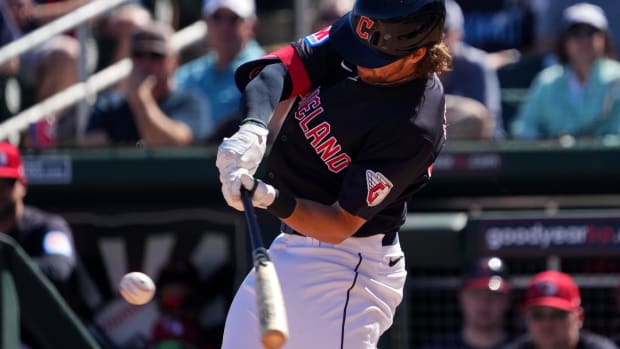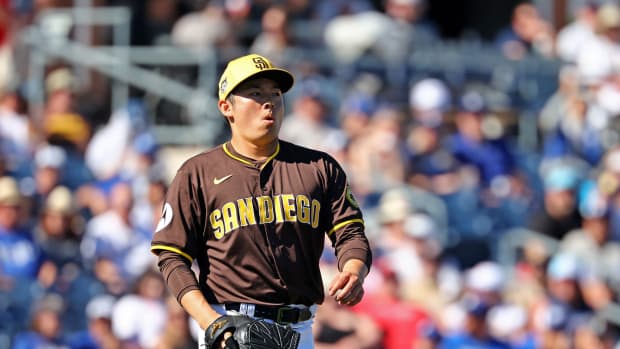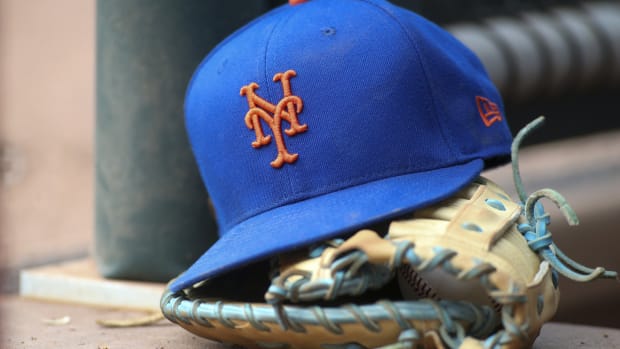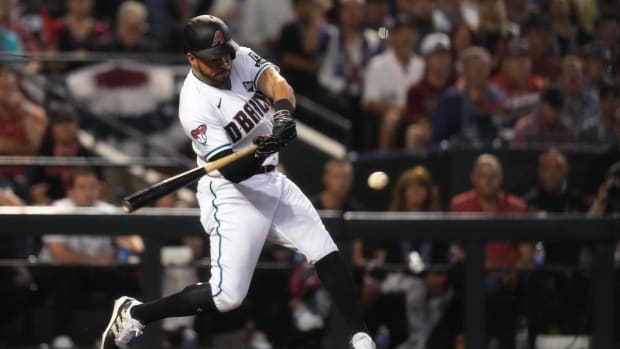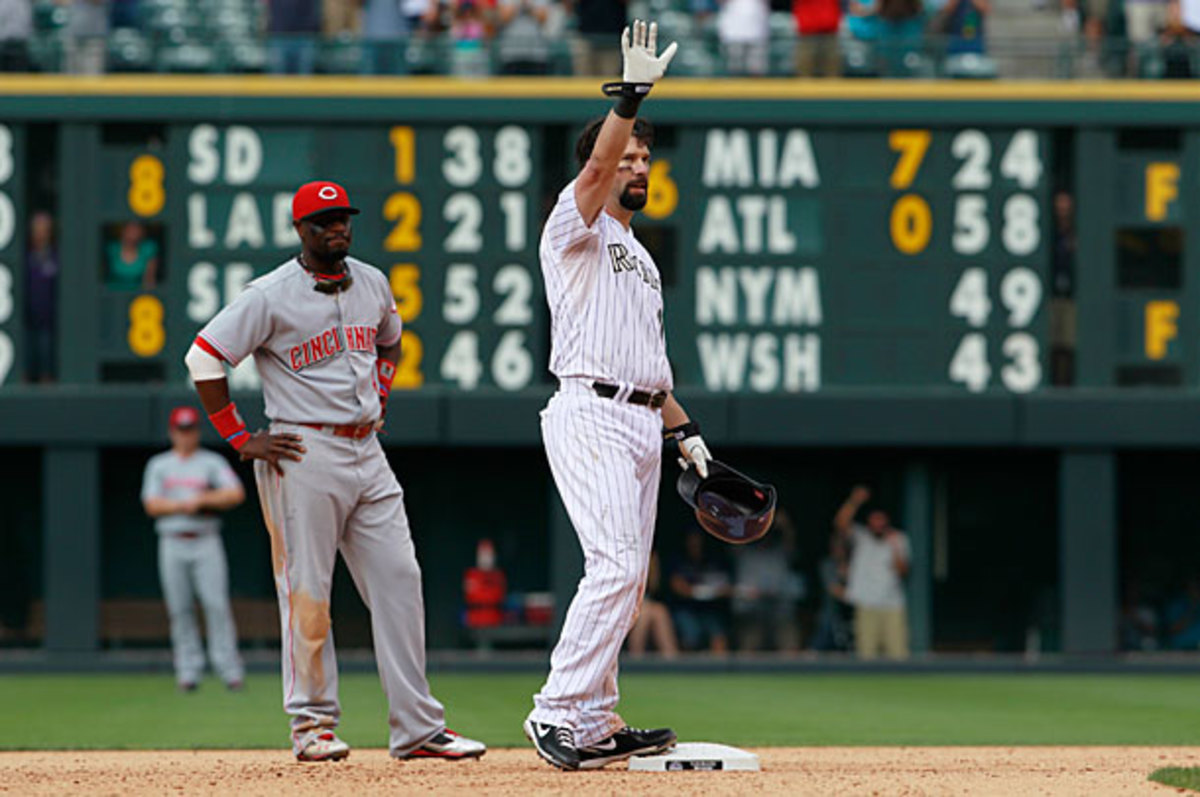
Todd Helton collects his 2,500th hit but Hall of Fame case remains up in the air
Todd Helton could be in his final days in a Rockies uniform. (David Zalubowski/AP)
On Sunday afternoon, Todd Helton collected his 2,500th career hit, reaching what's likely to be the last major milestone of his 17-year career and giving Rockies fans a chance to shower him with adulation. The 40-year-old first baseman hasn't officially announced that he's retiring at the end of this season, but given his age and his expiring contract, it is a distinct possibility.
That didn't detract from the moment. Facing Reds reliever Curtis Partch in the seventh inning at Coors Field, Helton worked Parch for six pitches before slicing a drive down the leftfield line on the seventh and legging out a double. The crowd of 30,594 rose to honor the player who holds virtually every major franchise record for offensive production: games (2,226), plate appearances (9,366), runs (1,389), RBIs (1,393) doubles (584), homers (365), total bases (4,53), walks (1,329) and Wins Above Replacement (61.4). Here's the hit, from MLB.com:
[mlbvideo id="30241031" width="600" height="360" /]
And here's a career highlight reel that MLB.com put together for the occasion:
[mlbvideo id="30195687" width="600" height="360" /]
Indeed, Helton has accomplished plenty during his time with Colorado, which began on Aug. 2, 1997. He earned All-Star honors five straight times from 2000 to '04, and won three Gold Gloves and a batting title. He also won the slash-stat Triple Crown in '00 when he hit .372/.463/.698 and accumulated more WAR than any first baseman of the post-1992 expansion era besides Albert Pujols (92.8) and Jeff Bagwell (70.1). Helton also helped the Rockies to the postseason in '07 and '09, and hit .333/.412/.467 in his lone World Series appearance (in '07).
While Helton has put up an extremely impressive batting line ( .317/.415/.540) during his career, playing half his games in the most favorable offensive environment in modern history has been a huge part of his story. At Coors Field, he has posted video game-level numbers (.346/.442/.607) for the sixth-best OPS at home since 1916 and the second-best of the post-World War II era (4,000 plate appearance minimum):
Rk | Player | Years | PA | HR | AVG | OBP | SLG | Home OPS | Road OPS | Dif |
1 | Babe Ruth | 1916-1935 | 5096 | 346 | .347 | .484 | .701 | 1184 | 1150 | 34 |
2 | Ted Williams | 1939-1960 | 4954 | 248 | .361 | .496 | .652 | 1148 | 1082 | 66 |
3 | Jimmie Foxx | 1925-1945 | 4678 | 299 | .345 | .453 | .663 | 1116 | 966 | 150 |
4 | Barry Bonds | 1986-2007 | 6124 | 379 | .301 | .449 | .618 | 1067 | 1037 | 30 |
5 | Lou Gehrig | 1923-1939 | 4660 | 251 | .329 | .436 | .620 | 1056 | 1102 | -46 |
6 | Todd Helton | 1997-2013 | 4793 | 224 | .346 | .442 | .607 | 1049 | 857 | 192 |
7 | Rogers Hornsby | 1916-1937 | 4627 | 164 | .361 | .439 | .593 | 1032 | 996 | 36 |
8 | Frank Thomas | 1990-2008 | 5011 | 312 | .305 | .424 | .599 | 1024 | 925 | 99 |
9 | Albert Pujols | 2001-2013 | 4197 | 226 | .325 | .417 | .597 | 1014 | 1003 | 11 |
10 | Stan Musial | 1941-1963 | 6331 | 252 | .336 | .427 | .582 | 1009 | 944 | 65 |
Elsewhere, Helton has hit very respectably (.288/.387/.470), but hardly at a historic pace. As you can see by the last two columns of the above table, his homefield advantage was far greater than any of the other nine hitters in that group.
As I noted in the context of former teammate Larry Walker's Hall of Fame case, the combination of Helton's home park with league scoring trends is the most favorable in history among players with at least 6,000 PAs, according to a Baseball-Reference.com stat called AIR. Using an all-time average of a .335 on-base percentage and a .400 slugging percentage, AIR indexes the park and league conditions under which each hitter has played into one number in the manner of OPS+, with 100 as league average, over 100 as favorable for hitters and under 100 as favorable for pitchers. Here's the top 10 using the 4,000 PA cutoff from the Walker piece. As you'll see, it includes quite a few former Rockies:
Rank | Player | PA | AIR |
1T | Todd Helton | 9366 | 122 |
Neifi Perez | 5365 | 122 | |
3 | Vinny Castilla | 7305 | 120 |
4 | Dante Bichette | 6777 | 117 |
5T | Larry Walker | 7958 | 116 |
Earl Averill | 7160 | 116 | |
Ski Melillo | 5402 | 116 | |
Rip Radcliff | 4398 | 116 | |
9T | Jeff Cirillo | 6026 | 115 |
Joe Vosmik | 6007 | 115 | |
Odell Hale | 4057 | 115 |
Has Helton done enough to earn a spot in the Hall of Fame? Last month, I took a look at the active players who had the best cases using my JAWS system, which measures the career and peak values of each player against the average enshrined player at their position. (Alas, I missed Helton in my initial roundup, then corrected the error in my follow-up.) Helton has accumulated 61.3 career WAR, which falls short of the average Hall of Fame first baseman (68.2). He's substantially above the standard on seven-year peak score, 46.5 to 43.2, but even so, his 53.9 JAWS is still a couple points short of the standard (55.7).
Overall, he ranks 14th in JAWS among first basemen, below eight Hall of Fame first basemen but above 12 others. Note that in this reckoning, Stan Musial is included as a first baseman, while in last winter's iteration, he was classified as a right fielder for having accumulated more value there. More recent changes in replacement level -- such as the one that calibrates B-Ref's version of WAR to the same scale as that of FanGraphs -- tend to bump Musial from one spot to the other. In any event, here's the current top 20 at the position (the entire leaderboard is here):
Rk | Player | Career | Peak | JAWS |
1 | Stan Musial* | 128.1 | 64.2 | 96.1 |
2 | Lou Gehrig* | 112.5 | 67.8 | 90.1 |
3 | Jimmie Foxx* | 96.5 | 59.5 | 78.0 |
4 | Albert Pujols | 92.9 | 61.5 | 77.2 |
5 | Cap Anson* | 94.0 | 41.8 | 67.9 |
6 | Roger Connor* | 84.2 | 47.0 | 65.6 |
7 | Jeff Bagwell | 79.5 | 48.2 | 63.8 |
8 | Dan Brouthers* | 79.4 | 47.2 | 63.3 |
9 | Johnny Mize* | 70.9 | 48.8 | 59.8 |
10 | Frank Thomas | 73.6 | 45.3 | 59.5 |
11 | Jim Thome | 72.8 | 41.6 | 57.2 |
Avg HOF 1B | 68.2 | 43.2 | 55.7 | |
12 | Rafael Palmeiro | 71.8 | 38.8 | 55.3 |
13 | Willie McCovey* | 64.4 | 44.8 | 54.6 |
14 | Todd Helton | 61.3 | 46.5 | 53.9 |
15 | Eddie Murray* | 68.2 | 38.9 | 53.6 |
16 | Hank Greenberg* | 57.6 | 47.7 | 52.6 |
17 | Mark McGwire | 62.0 | 41.9 | 52.0 |
18 | George Sisler* | 54.2 | 47.0 | 50.6 |
19 | Keith Hernandez | 60.1 | 41.0 | 50.6 |
20 | Harmon Killebrew* | 60.4 | 38.1 | 49.2 |
(* = Hall of Famer)
If Musial is classified as a right fielder, the averages across the board are 64.7, 42.1 and 53.4, which would put Helton right above the line. Even so, it's worth noting that contemporaries Pujols, Bagwell (who's been on the ballot for two years), Thomas (who becomes eligible this winter) and Thome (who won't be eligible until 2018) have better scores and stronger cases than Helton. The latter trio may well raise the JAWS standard by the time Helton is eligible, which assuming he does pack it in after this season wouldn't be until 2019.
Beyond the appropriate adjustment for environment that lets the air out of his park-inflated numbers, the big problem with Helton's case is his rapid decline after 2007, the season he turned 33. To that point, he had hit .332/.430/.583, with 303 homers and accumulated 54.5 WAR while averaging 154 games a year since 1998, his first full season. Due to surgeries for back, hip and knee ailments, he has averaged just 108 games, 10 homers and 1.1 WAR a year since the beginning of '08, hitting a cumulative .280/.376/.428. Only twice in that span has he been worth more than 1.0 WAR, while three times he's been worth 0.3 or less; this year, he's in the red at −0.3 on .252/.321/.407, with 11 homers in 355 PA. Replace those three years (net 0.0 WAR) with one-win seasons and he'd be a hair's breadth from the current JAWS standard for first basemen.































